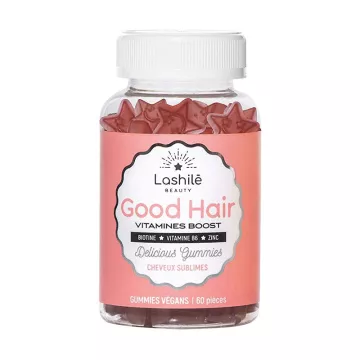
What causes hair fatigue?
Tired hair is often the result of a combination of factors such as environmental stress, excessive use of chemicals (coloring, straightening), heat from styling appliances (hair dryers, straighteners), and an unbalanced diet. These elements damage the health of the hair fiber, making it dull, dry and brittle.
How can I tell if my hair is tired?
Signs of tired hair include rough texture, lack of shine, increased tendency to frizz and split ends. If your hair seems constantly unruly and lacks suppleness, it's likely that it's in an advanced state of fatigue.
What are the best practices for preventing hair fatigue?
To prevent hair fatigue, we recommend :
Limit the use of chemical treatments and heat.
Use appropriate hair care products, such as gentle shampoos and moisturizing masks.
Eat a diet rich in essential nutrients such as vitamins A, C, E, omega-3 and proteins.
Protect hair from external aggressors (sun, wind, chlorinated water) with specific products.
What specific treatments are recommended for tired hair?
To revitalize tired hair, opt for treatments rich in keratin, amino acids and natural oils such as argan or coconut oil. These treatments help restructure the hair fiber from within and seal in moisture. Hair masks based on shea butter or aloe vera are also highly effective for deeply nourishing hair.
What daily routine should I adopt to revitalize my hair?
An ideal daily routine for tired hair should include :
A gentle wash with a sulfate-free shampoo, followed by a nourishing conditioner.
Twice a week, apply a deeply moisturizing mask.
Limit use of the hair dryer, preferring to air-dry.
Detangle your hair with a soft bristle brush to avoid breakage.
What are the best products to use for tired hair?
For tired hair, we recommend choosing products enriched with antioxidants, vitamins and essential oils. Look for formulations that contain keratin,argan oil, panthenol and plant extracts such as chamomile or green tea, which are known for their revitalizing properties.
How can I protect my tired hair on a daily basis?
To protect your hair on a daily basis, use styling products that offer protection against heat and UV rays. Wear a hat or scarf during prolonged exposure to the sun. Also, avoid tight elastics and hairstyles that pull on the roots, preferring soft ties.
Are there any natural remedies for tired hair?
Among natural remedies, homemade masks based on honey, eggs and olive oil are highly beneficial for tired hair. These ingredients provide intense hydration and help restore your hair's natural shine.
How does stress affect the health of my hair?
Stress can have a significant impact on hair health. It can cause temporary hair loss, known as telogen effluvium, where hair prematurely goes into a resting phase before falling out. Stress can also reduce the blood supply to hair follicles, limiting the essential nutrients needed to keep hair healthy. It is advisable to manage stress through relaxation techniques such as yoga, meditation or regular exercise.
Can damage to tired hair be reversed?
Although hair damage is often irreversible, it is possible to minimize and mask the effects. Regular use of deep treatments and repair products can help improve the appearance of hair. Regular trimming is also essential to eliminate split ends and encourage healthier regrowth. For best results, consult a hair care professional who can recommend treatments suited to your hair type.
How important is water in the care of tired hair?
Hydration plays a crucial role in hair health. Drinking enough water ensures good hydration not only for the body, but also for the hair. It helps regulate the circulatory system, which can improve hair follicle health and promote healthy hair growth. Be sure to drink at least 2 liters of water a day and use moisturizing hair products to keep your hair nourished and revitalized.
Can specific vitamins and minerals help revitalize tired hair?
Yes, some nutrients are particularly beneficial to hair health. B vitamins, notably biotin (B7) and niacin (B3), play a crucial role in hair growth by helping to improve blood circulation in the scalp and strengthening hair keratin. Iron, zinc and vitamin E are also important, helping to repair and protect hair tissue. Incorporating these nutrients into your diet or taking supplements can help improve the condition of your hair.
What role do proteins play in the treatment of tired hair?
Protein is the basic building block of hair, making up around 95% of its structure. Adequate protein intake is crucial to maintaining hair's strength and elasticity. Protein treatments, such as keratin hair masks, can help rebuild damaged hair structure and prevent future breakage. It is recommended to perform these protein treatments regularly in the salon or at home to maintain healthy, vigorous hair.